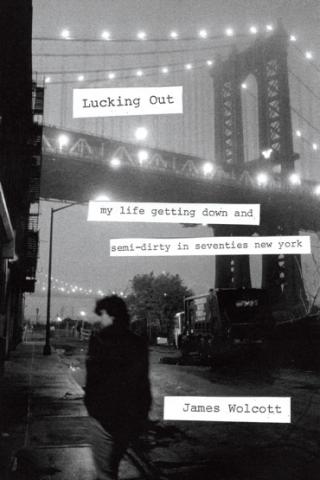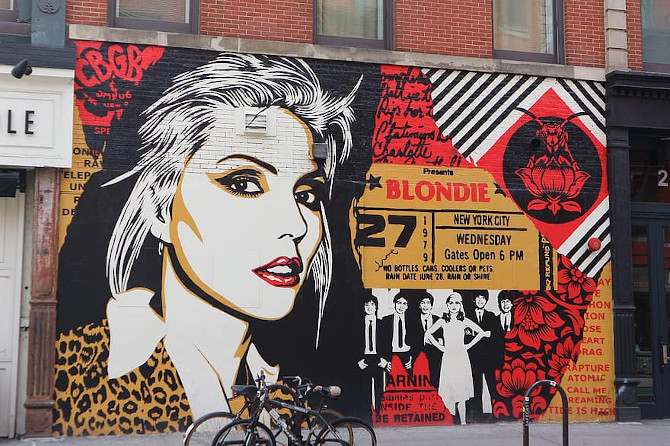James Wolcott Lucks Out in the Big Apple

Lucking Out: My Life Getting Down And Semi- Dirty in Seventies New York
James Wolcott
Doubleday
258 pages
It’s not altogether clear how a handful of critics mature to eventually become experts on politics, on culture, on the fate of the planet—on, well, everything. James Wolcott, columnist for Vanity Fair, is one of the elite few, along with his compatriots Frank Rich, Gore Vidal and Christopher Hitchens--men who are likely to have opinions (and some expertise) on every subject under the sun.
It doesn't hurt that Wolcott, like his erudite colleagues, can write up a storm. He proves this once again with a gritty and compulsively readable memoir, Lucking Out: My Life Getting Down and Semi-Dirty in Seventies New York. Not quite a memoir in the conventional sense, rather Wolcott has written five long essays that seek to encapsulate the reckless, head-long world of movies, Punk music, porn and the New York City Ballet during a time when the glittering metropolis was both grimy and resplendent, when the likes of Norman Mailer, Blondie and Balanchine somehow co-existed in an urban fever dream of creativity not seen since.
It all started in 1972, when Wolcott arrived in New York after dropping out of Frostburg State University in Maryland. His adventures were triggered by a piece he’d written for the student newspaper concerning an episode of the “Dick Cavett Show” in which Mailer famously sparred with Vidal and Janet Flanner. The piece got Mailer’s attention, who in return penned a letter of introduction to Dan Wolf, editor and co-founder of The Village Voice.
From there it was up to the stripling journalist to keep knocking on Wolf’s door in search of assignments: “Every few days I would visit the Voice, asking if anything had ‘opened up,’ varying the timings of my visits to lend them an air of happenstance, as if I were just popping in on my way elsewhere, some trifling errand perhaps, toeing that delicate line between harmless nuisance and complete pest.” But time and money were running out. Just as he was about to toss in the towel and take a bus back to Maryland, he made one last call to Wolf, who gave in with a sigh.
“And, really, everything that’s happened to me since swung from the hinge of that moment, the gate that opened because one editor shrugged and said, ‘Ah, what the hell.’”
One thing that happened was meeting legendary film critic Pauline Kael and quickly getting swept up in her polymorphous circle of admirers and colleagues. Part II of Lucking Out is a loving and not uncritical portrait of Kael at the height of her fame and influence. They attended movie screenings together, talked incessantly over the phone, enjoyed tweaking the refined sensibilities of New York intellectuals by embracing (or at least not wholly rejecting) the ever-pervasive growth of pop culture. Cultural boundaries and definitions were breaking down, and Kael celebrated it in vigorously written New Yorker reviews (“She wanted the writing to read like one long exhalation that would seize the reader from the opening gunshot and then drop him off at the curb after a dizzy ride”). His portrait of Kael—a prickly, idiosyncratic, self-made woman who ended up overturning all the conventions of film criticism—takes on an elegiac air, as if he were writing about the extinction of a beloved species.

“One thing I learned from Pauline was that when something hits you that high and hard, you have to be able to travel wherever the point of impact takes you and be willing to go to the wall with your enthusiasm and over it if need be, even if you look foolish or ‘carried away,’ because your first shot at writing about it may be the only chance to make people care. It’s better to be thumpingly wrong than a muffled drum with a measured beat.”
Good advice, it turns out, as Wolcott transitioned to writing music reviews for the Voice and other outlets, just as Punk was rearing its spiked, multi-colored hair. On hand for one of Patti Smith’s early performances at CBGB on the Lower East Side, he knew he was in the presence of greatness:
“ … Patti already had her stage persona pencil-sharpened into a self-conscious, couldn’t-care-less wild child, playing with her zipper like a teenage boy with a horny itch, pistoning her hips, hocking an amoeba bob of spit between songs, scratching her breast as if addressing a stray thought … It was one of those nights when the invisible partition between you and the performance dissolves and you realize, This is something, even if you don’t know what that ‘something’ is yet. There’s a knock at the door that you have to answer.”
Punk, porn, and the backbiting wars of literary critics in the 70s come thrillingly to life in the pages of Lucking Out. Less thoroughly described is Wolcott’s personal life. He hints at numerous relationships, failed and otherwise, with women of the time, but offers few concrete details. His focus remains fixed on the whirlwind culture, which makes this a book worth keeping on hand as we move ever farther into an unpredictable future.
At times, Wolcott’s rampant name-dropping can induce a kind of reader’s vertigo. On one page alone he references Blythe Danner, Gywneth Paltrow, Meryl Streep, Larry McMurtry, Madonna, David Mamet, Julianne Moore and David Hare, before stopping to take a breath. Yet somehow it feels true to the epoch he’s writing about—a time when cultural phenomena still seemed to mean something, unlike the will-o-the-wisp effluvia we’re all subjected to today.
Lucking Out is a rich, Proustian memoir of an era that shows, in Wolcott’s words, “how far the [ [media] have culturally slid since then into the far side of moronica … because none of their editors know anything apart from what they read online or what’s memo’d on the inside walls of their bunker mentality.”
Author Bio:
“Death Threat,” an excerpt for Lee Polevoi’s new novel, The Confessions of Gabriel Ash, appeared recently in Highbrow Magazine.
Photo credit: Pikist (Creative Commons)





























































































































































































































































































































